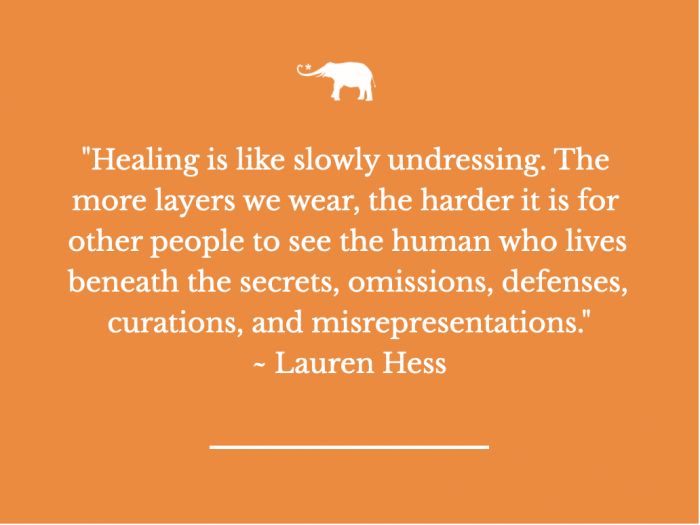~
Hating my body is not merely an inconvenient or nagging voice inside my head.
My distorted body image has often made me feel less than human. Shame runs through my capillaries, imprinted on each cell, written in my genetic code. Shame—cunning, hungry, consumptive, thieving, and opportunistic. It metastasizes so brilliantly; I can’t possibly outpace it.
My twisted logic goes something like this: bipolar and anxiety disorders happened to me. But my eating disorder has always felt like a lifestyle choice. Having a troubled relationship with food is a sign of weakness. It’s a lack of discipline.
It has taken me decades to unpack that my issue with weight was never a matter of “letting myself go.” It was desperate wrestling with the pain of never having myself in the first place.
My body—this mortal, temporary vessel—is the source of more humiliation than the sum of all of my flaws, defects, unflattering truths, and stains on my record. This 5’2 home of flesh and bones is constantly tuned to a frequency of inadequacy. But shame is a prison for which I am the sole gatekeeper—and I want out.
I’ve hated my body ever since I learned how to hate, long before society confirmed in no uncertain terms that I should, indeed, hate my body. The contempt has spanned decades and pant sizes. The self-loathing is innate. It seems to have been here since the beginning of everything. It feasts on the overt and covert messaging around body image. And it doesn’t wax and wane. Self-criticism infiltrates its host indefinitely.
Body shame is cancerous, parasitic, and bloodthirsty. It seeks to annihilate. It stalks the scent of vulnerability. It preys on children.
It started when I was a child. I began numbing my feelings with food when I was very young. My parents (like everyone’s) were not perfect, and neither was their marriage. But generally speaking, I had a warm, loving childhood. I can’t pinpoint the inaugural moment when I learned to equate food with relief from pain, anxiety, boredom, discomfort, loneliness, or inadequacy. I don’t know exactly when I located the escape hatch, but as soon as I did, I became addicted to emotional and spiritual ejection.
Get out! Get out of your head, your heart, your feelings, your body—get out of you.
One childhood Christmas, hiding in my narrow bedroom closet in pitch-black darkness, I dissociated as I cradled a bowl of red, green, and silver holiday-themed Hershey’s kisses. I ate and I ate and I ate, forming a little mountain of shiny foil balls beside me on the closet floor. The binge reached its anticlimactic finale, and I gathered the shrapnel of wrappers and hid the evidence. This was the beginning of a life of masterful hiding. Hiding feelings, hiding potential, hiding my light, hiding everything true.
Binge eating was also a modeled behavior. I watched my father medicate his anxiety with food until it ultimately killed him when he was 61. Even as an adult, I didn’t fully grasp my dad’s propensity to overeat as a coping mechanism. He was “fine.” He didn’t drink or gamble or chase women or get angry. What did pizza and ice cream have to do with anything? Sometimes, I thank God that our brains know precisely which truths to keep hidden behind the curtain. “Fine,” a dangerous word, indeed.
My higher intelligence wouldn’t allow me to consciously recognize that my dad was living in considerable, quiet pain until after several years after his tragic, premature death. Knowing that I witnessed someone I love beyond measure slowly commit suicide unstitches my heart and burns the threads. That is love. That is codependence. That is addiction. That is pain kept a secret. He was not fine.
My weight has fluctuated considerably over the years. Not surprisingly, I’ve been my heaviest during the deepest trenches of my bipolar depression, and at the sky-high peaks of my anxiety. You can tell how I’m doing by looking at me—the bigger I am, the bigger my “sickness” was. Constantly battling my weight and hustling for self-worth is like being taken for a ride atop a giant yo-yo. Something outside of me is tugging at the strings of my life in a wild, jerking manner. I am not in control, and I know it. All I can do is hold on, close my tired eyes, and pray.
Gaining and losing weight has been a twisted means to secure love and affection. Descending numbers on the scale reap rewards: compliments, attention, and this warm, inner sunshine that lights my body from the inside out. Adulation for losing weight is a high like no other. I can’t drink, snort, fornicate that kind of esteem into my nervous system.
Until recently, my approach to weight loss was drastic and unhealthy. Shedding pounds was often the result of severe restriction and embodying a manic state of hypervigilant self-monitoring and near-constant criticism. But self-loathing was impervious to the numbers on the scale. It didn’t matter if I was 120 or 180 pounds. I spent most of my time in the panicky, silent space between dopamine hits from external sources.
And then, there was college. In my freshman year, I made several futile attempts to purge. The logistics and mechanics were just too tricky and inconvenient. I found a new low: I failed to develop a “proper” eating disorder. I was wildly jealous of the girls with more dexterity and grace who had figured out how to vomit on command. You were not allowed to be overweight at Boston College. How much pasta went down the drains of those shared showers? Evading bulimia probably saved my life. But with countless forays into dieting, and a fair amount of creativity (e.g., the lollipop and cigarette diet), I mastered other strategies to control my weight and my worth.
But no matter how many pounds I shed, the void remained a void. Emptiness is decidedly stubborn. I rabidly scoured for evidence that I was, in fact, worthy of love—that I was “good enough.” I folded. I gave into a fast, easy, and surefire way to build a steady pipeline of external validation: reliable, unremarkable, and utterly addictive sex.
Being promiscuous didn’t come easy. I wanted to be loved, not used. And I was too smart to know that almost everything wasn’t love. So, I did what any self-respecting girl would do: I drank and did drugs to numb myself into objectivity. Each time I slept with someone new, I cataloged the evidence. Lists of names were proof that I was desirable, worthy of conquest, and not “too fat.” I doled out pieces of myself and my body like cheap, unbranded candy that nobody really wanted anyway (but hey, it was free). My heart kept beating only because it had to.
I became deeply mistrusting. My motives around sex and love were largely self-serving, so I became highly suspicious of anyone who claimed to truly care for me. The kind, good people weren’t to be believed. You cannot love an unlovable thing, and I knew better. My plan backfired: in seeking love, I lost the capacity for it.
My sex and love addiction were just as dangerous, if not more, than my other addictions—physically, emotionally, and, especially, spiritually. I slept with people under the guise that I was a sexually empowered, free-spirited woman—which is, unquestionably, one of the most transparent, enduring lies I’ve told myself and others. And I truly believed it. I bought into the “Sex and the City” farce with assurance and enthusiasm. I felt invincible in the bedroom (or kitchen, or backseat, or bathroom stall). But I wasn’t. I was the scared, little girl crouched in the closet, trying desperately not to feel.
I was not empowered. I was not free. I was hustling, outsourcing, chasing, selling, and self-abandoning. I was a broken soul seeking love in the most degrading and unsatisfying way. My self-esteem was nonexistent, and my spirit was shattered. The rearview mirror was cracked, and everything in sight was wreckage. My insides felt as though they were constantly rushing through a bottomless runaway elevator.
Could I please just die young? Death would have been a merciful act.
For me, substance abuse, binge eating, and sex are inextricable. Eating 30,000 cookies or having meaningless sex in the absence of drugs and alcohol was surprisingly difficult. Digging my own grave with a clear mind was unsettling. Being self-aware enough to know I was killing some tender part of myself killed my buzz, too. But my addictions needed me. So I got drunk and high and left my body, allowing vicious, self-betrayal to unfold with the pantry as my witness (or the bed of a stranger, depending on which vice we’re referencing).
And then, the miracle happened. After 20 years, I made the life-changing commitment to get and stay sober from drugs and alcohol. The desire to binge has been nonexistent since March 2020. The desire to become physically intimate with a stranger even less so.
I gradually lost 30 pounds . And this recent weight loss feels different. It’s happening naturally. I’m not dieting. I’m not obsessing. I’m not criticizing or measuring how much farther I have to go until I reach that destination you never actually reach because it’s a place born from the fantasy that was never real in the first place.
When I receive compliments, it feels nice, but not defining. Or if my weight loss goes unmentioned, I don’t feel unnoticed. I am no longer an animal on the slab for judgment. I am no longer in a cage.
In preparation for a small family vacation, I bought a handful of two-piece swimsuits. (For context, I haven’t worn a bikini since I was starving myself in college in the early 2000s.) Like a holy revelation, it occurred to me that I have the God-given right to wear swimsuits that I love, period. Not “regardless of,” just, period.
Healing is like slowly undressing. The more layers we wear, the harder it is for other people to see the human who lives beneath the secrets, omissions, defenses, curations, and misrepresentations. But I want to be seen. I am so unbelievably exhausted from trying to be anyone other than who I am. I am a person who struggles with body image, and I am someone who is committed to undoing a lifetime of maladaptive conditioning, secret-keeping, and shame-spiraling.
Life is a circus. No one is really qualified to do anything, and everything hurts. So we tell stories. That is the grand design. We chronicle the excruciating and beautiful experience of life. We gut ourselves publicly and spark tiny fires of liberation. We see ourselves in one another. And in the space of human mirrors and warm recognition, life wraps its clumsy arms around us. We are granted permission to be who we are — to live our lives out loud.
So, there. I did it. I talked about the things I swore I would never speak about, and it didn’t kill me.
How much freedom did I just claim? How much space have I cleared for something surprising, stunning, healthy, and new?












Read 5 comments and reply